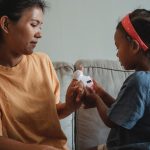Many parents wonder what’s the best way to deal with child fever and when is the best time to consult a doctor.
Nobody wants their children to be sick! It’s heartbreaking to see our little ones exhausted by a fever and struggle to overcome it.
We put ourselves in a panic and uncomfortable situation trying to help our little ones fight the fever.
You probably know it’s best to stay calm and observe the child’s fever. But parents can’t stay calm when their children are sick!
So, that’s why we’re here! We’ll give you a quick guideline on child fever and help you stay collected during those periods.
Child Fever Temperature Chart
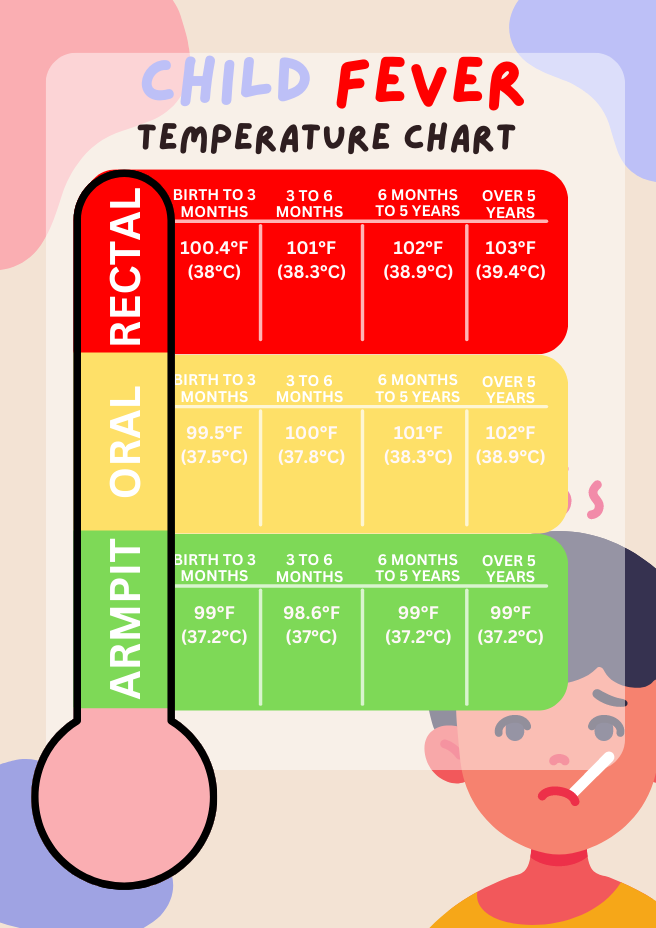
What Can Be Considered as Fever in Children?
According to medical experts, a child fever is considered a body temperature of 38°C (100.4°F) or higher.
Healthy children’s body temperature is between 36.5°C (97.7°F) and 37.2°C (99°F), but it can vary from person to person.
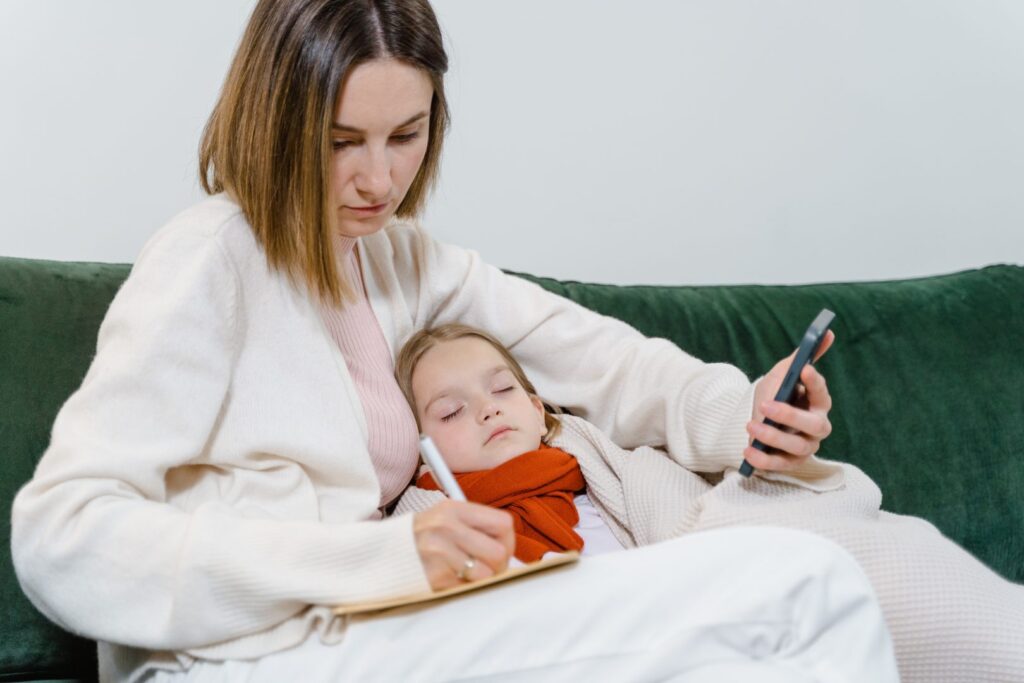
But why does a fever occur? Well, viruses and bacteria make us sick. So, our body turns on its stove so that it’s easier to kill those harmful microorganisms.
Shortly, a fever is a normal body response. But the higher it gets, the harder it is for you and your child.
Common Causes of Fever in Children
We all have been through sleepless and neverending nights battling child fever. So, let’s find out the common causes of fever in children.
· Viral Infections and Their Impact
Most viral infections cause fever in children, lasting for 2-3 days or 10-14 days, depending on the type of the virus.
Usually, the fever is between 38.4°C (101.12°F) and 40°C (104°F), accompanied by other symptoms such as:
- Headaches;
- Body rash;
- Runny nose and sneezing;
- Watery eyes;
- Dry and swollen throat;
- Muscle pain;
- Tiredness and dehydration;

Fighting viral infections demands observing and controlling the fever by staying hydrated and resting. In this situation, consult a medical professional that will tell you which medictions are the best for your child.
· Bacterial Infections and Fever
Bacterial infections such as ear and throat infections, urinary tract infections, or pneumonia cause fever in children.
Bacterial infections can develop after viral infections or when harmful bacterias enter your organism.
Bacterial infections come with a prolonged fever lasting ten or more days. Other symptoms may include intense cough, breath difficulty, urinary problems, etc.
Bacterial infections can cause serious damage to children’s health. So if the situation gets out of control, contact medical experts!
· Immunizations and Fever
Vaccines are an effective way to prevent ancient and dangerous diseases from harming the human population.
But in the past few years, people have started losing their trust in vaccines accusing them of disrupting children’s health.
According to the American Academy of Allergy Asthma and Immunology, vaccines don’t contain any ingredients that may cause disorders in children.

· Teething Troubles: Separating Normal Fever from Concerning Signs
So, your baby has popped out its first teeth. But, instead of celebrating, you have to cure a fever. Well, medical experts at the National Library of Medicine state that teething may cause a minor fever.
If your child displays a high fever during teething, it’s most likely that your child is suffering from an infection.
Coincidences happen even in the human body! So, don’t start blaming teeth when your children have a fever.
Detecting and Measuring Your Child’s Fever
The tool parents can use to measure children’s body temperature is called a thermometer.
Two types of thermometers exist, electronic and plastic strip thermometers. Please remember that electronic thermometers are more accurate!
There are a few spots on your children’s bodies you can use to measure their temperature. Those include:
- Mouth;
- Ear;
- Armpit;
- Rectum;
Note that placing an electronic thermometer in the rectum requires an appliance of petroleum jelly on the tip of the thermometer. It’s best for newborns and infants.
Always contact a medical professional if you aren’t sure how to use your thermometer. You don’t want to make things worse for your little ones!
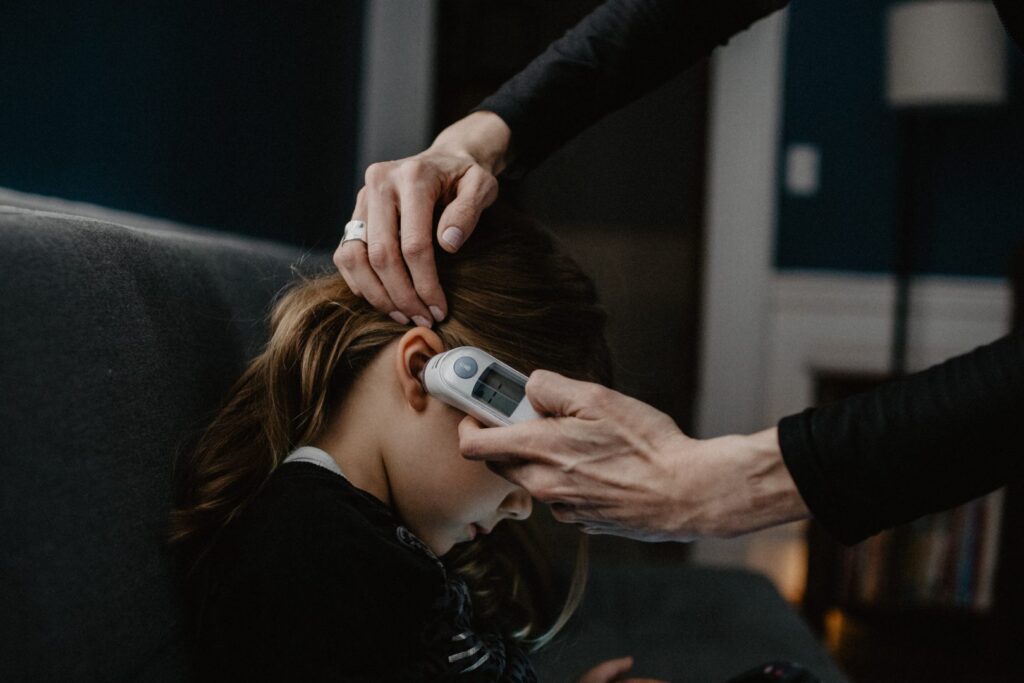
When children are sick, check their body temperature every few hours, especially if they have a high fever.
What is Considered a High-Temperature Fever for a Child?
Feeling that your child has a high fever can make any parent panic. But what is actually considered a high-temperature fever?
- If your child is 3 months old or younger and has a rectal temperature of 38°C (100.4°F) or higher;
- If your older child has a temperature higher than 39°C (102.2°F);
How to Reduce Fever in Children Naturally
Medicine isn’t the only thing that can help reduce child fever. You must also give your children all your love and care.
Firstly, make sure that your child’s bed is comfortable. Change your child’s clothes if they’re sweaty, and keep the room well-ventilated.
Moreover, you must keep your children hydrated. Drinking liquids can help lower your child’s fever more quickly.
You can also give your children some medications, such as acetaminophen or ibuprofen. Consult medical professionals regarding the dosage!
Also, make sure to give children your company while they’re sick. Never let them feel lonely and sad because happiness can help children overcome sickness.
Alarming Signs: When to Seek Urgent Medical Attention
If your child displays a fever higher than 38°C (104°F), seek medical help, especially if the fever remains high.
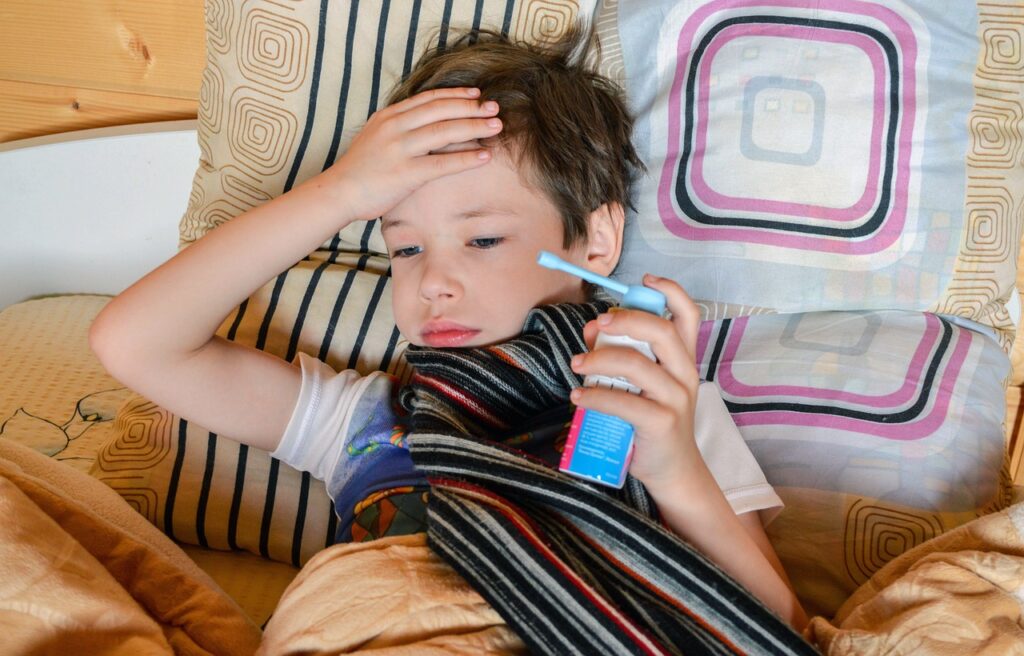
Other alarming symptoms may also appear, including dizziness, shaking, headache, coldness, etc. Moreover, your child can showcase behavioral changes, such as frustration, panic, fright, etc.
Dehydration and breathing symptoms can also be caused by a high fever. Contact medical professionals if you notice these symptoms!
When should you worry about a kid’s fever?
Long-lasting high fever accompanied by hallucinations, dehydration, and changes in skin color (especially around the mouth) are active alarms that you should rapidly bring your child to the hospital.
Is 37.5 a fever in a child?
37.5°C is a lower fever in children. If your child has a body temperature of 37.5°C, monitor the situation and contact a doctor if the fever gets higher.
My toddler has a fever but no other symptoms. What to do?
The fever can be a normal body response. When there aren’t any other symptoms, make sure to hydrate your child and show parental warmth and care.
If any symptoms appear, you can contact a medical professional, But things should go back to normal after a few days.
ALSO READ: What is a Normal Heart Rate for a Child Through Ages


